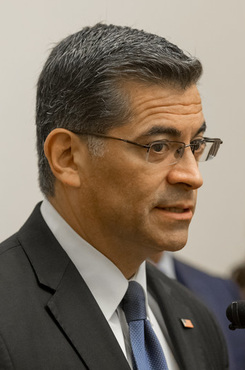13 States Sue to Block T-Mobile/Sprint Merger
James, along with California Attorney General Xavier Becerra, is leading a coalition of 13 states in litigation seeking to block the merger, which she maintained Friday would hurt consumers.
July 26, 2019 at 03:24 PM
5 minute read
The original version of this story was published on New York Law Journal
 New York State Attorney General Letitia James. (Photo: Diego M. Radzinschi/ALM)
New York State Attorney General Letitia James. (Photo: Diego M. Radzinschi/ALM)
New York Attorney General Letitia James doubled down on her opposition to the proposed merger between telecommunications companies T-Mobile and Sprint Friday, immediately after the deal secured approval from the U.S. Department of Justice.
James, along with California Attorney General Xavier Becerra, is leading a coalition of 13 states in litigation seeking to block the merger, which she maintained Friday would hurt consumers.
 California State Attorney General Xavier Becerra. (Photo: Jason Doiy/ALM)
California State Attorney General Xavier Becerra. (Photo: Jason Doiy/ALM)“The proposed merger of Sprint and T-Mobile, two of the nation's largest telecommunications providers, would cause irreparable harm to mobile subscribers nationwide by cutting access to affordable, reliable wireless services for many Americans, especially lower-income and working families here in New York and across the nation,” James told reporters.
She said they've reached an agreement with attorneys from the two companies to delay the merger until the litigation is resolved, which makes a temporary restraining order or injunction unnecessary. A trial on the matter is scheduled for early October in the U.S. District Court for the Southern District of New York in Manhattan.
“The merger is conditioned on a resolution in our litigation,” James said.
The deal struck to secure the DOJ's approval Friday would require the new mega-company to divest Sprint's prepaid subscription service and part of its wireless spectrum to DISH, a satellite TV company.
The intention of that compromise would be to sustain competition in the wireless communications industry by essentially creating a fourth major operator. John Legere, CEO of T-Mobile, was optimistic about the agreement in a statement Friday.
“Our goal was to ensure that the DOJ's concerns were addressed while enabling us to deliver on every aspect of the synergies we promised to unlock … and we did it,” Legere said. “It may have taken longer than expected by some, but today's results are a win-win for everyone involved.”
James disagreed, expressing skepticism that the outcome of the deal expected by the two companies and the DOJ would actually be realized.
“DISH has never owned any kind of mobile wireless business,” James said. “DISH has no experience building or operating a nationwide mobile wireless network, yet the DOJ claims this deal will create a fourth national network that will step into Sprint's shoes and preserve a competitive market for consumers.”
She argued that DISH doesn't have the same infrastructure, as of now, that Sprint does, meaning that the satellite company couldn't take its place as a major wireless services provider if the merger is finalized. In fact, James said, DISH would have to rely on the T-Mobile network at the outset.
The merger, which was announced last year, has already been recommended for approval by the chairman of the Federal Communications Commission, which is also required to sign off on the agreement. That agency has yet to give final approval. The sale is valued at $26 billion.
James, along with the other states involved in the litigation, alleged last month that T-Mobile and Sprint had made promises to consumers as part of the merger that they couldn't deliver on anytime soon, if at all. Those included guarantees of lightning-fast speeds and increased capacity, which the states claimed couldn't be verified.
They also argued that, with one less major player in the telecommunications industry, prices could be driven up for cell service. James said that any price increase caused by the merger could be detrimental for consumers who may be forced to drop their service.
“Consumers throughout this nation rely on cellular phones to make calls, send texts, surf the web and communicate over email every day,” James said. “It is a basic and necessary service that all Americans should have access to and be able to afford.”
T-Mobile and Sprint are already two of the four largest cell carriers in the U.S., with Verizon Wireless and AT&T being the others. The former two are also known to generally have lower prices than the latter couple, the states have claimed.
Having all four in the market has led to declining prices over the last decade, coupled with increased coverage. The states argued in their lawsuit last month that, if approved, the merger would halt that trend.
T-Mobile and Sprint have said the merger will allow them to expand wireless service to rural areas that may not have comprehensive cell service, as of now. That would include 5G, the fastest wireless network to date.
James has pushed back on those claims, saying that an investigation by her state, and others, found that the megacompany wouldn't be able to deliver on many of those promises until several years in the future, if ever.
She said Friday that they may amend their lawsuit in the near future to reflect the DOJ's approval. Aside from California, the lawsuit was also brought by attorneys general from Colorado, Connecticut, the District of Columbia, Hawaii, Massachusetts, Maryland, Michigan, Minnesota, Mississippi, Nevada, Wisconsin and Virginia.
READ MORE:
NY AG Brings Multistate Suit to Block Merger of Sprint, T-Mobile
Debt Collection Company Owners Agree to Pay $60M Under Settlement With NY AG
New York Enacts New Data Security Requirements to Protect Consumer Information
This content has been archived. It is available through our partners, LexisNexis® and Bloomberg Law.
To view this content, please continue to their sites.
Not a Lexis Subscriber?
Subscribe Now
Not a Bloomberg Law Subscriber?
Subscribe Now
NOT FOR REPRINT
© 2025 ALM Global, LLC, All Rights Reserved. Request academic re-use from www.copyright.com. All other uses, submit a request to [email protected]. For more information visit Asset & Logo Licensing.
You Might Like
View All
Litigators of the Week: A Knockout Blow to Latest FCC Net Neutrality Rules After ‘Loper Bright’

An ‘Indiana Jones Moment’: Mayer Brown’s John Nadolenco and Kelly Kramer on the 10-Year Legal Saga of the Bahia Emerald

Litigators of the Week: A Win for Homeless Veterans On the VA's West LA Campus

'The Most Peculiar Federal Court in the Country' Comes to Berkeley Law
Trending Stories
Who Got The Work
J. Brugh Lower of Gibbons has entered an appearance for industrial equipment supplier Devco Corporation in a pending trademark infringement lawsuit. The suit, accusing the defendant of selling knock-off Graco products, was filed Dec. 18 in New Jersey District Court by Rivkin Radler on behalf of Graco Inc. and Graco Minnesota. The case, assigned to U.S. District Judge Zahid N. Quraishi, is 3:24-cv-11294, Graco Inc. et al v. Devco Corporation.
Who Got The Work
Rebecca Maller-Stein and Kent A. Yalowitz of Arnold & Porter Kaye Scholer have entered their appearances for Hanaco Venture Capital and its executives, Lior Prosor and David Frankel, in a pending securities lawsuit. The action, filed on Dec. 24 in New York Southern District Court by Zell, Aron & Co. on behalf of Goldeneye Advisors, accuses the defendants of negligently and fraudulently managing the plaintiff's $1 million investment. The case, assigned to U.S. District Judge Vernon S. Broderick, is 1:24-cv-09918, Goldeneye Advisors, LLC v. Hanaco Venture Capital, Ltd. et al.
Who Got The Work
Attorneys from A&O Shearman has stepped in as defense counsel for Toronto-Dominion Bank and other defendants in a pending securities class action. The suit, filed Dec. 11 in New York Southern District Court by Bleichmar Fonti & Auld, accuses the defendants of concealing the bank's 'pervasive' deficiencies in regards to its compliance with the Bank Secrecy Act and the quality of its anti-money laundering controls. The case, assigned to U.S. District Judge Arun Subramanian, is 1:24-cv-09445, Gonzalez v. The Toronto-Dominion Bank et al.
Who Got The Work
Crown Castle International, a Pennsylvania company providing shared communications infrastructure, has turned to Luke D. Wolf of Gordon Rees Scully Mansukhani to fend off a pending breach-of-contract lawsuit. The court action, filed Nov. 25 in Michigan Eastern District Court by Hooper Hathaway PC on behalf of The Town Residences LLC, accuses Crown Castle of failing to transfer approximately $30,000 in utility payments from T-Mobile in breach of a roof-top lease and assignment agreement. The case, assigned to U.S. District Judge Susan K. Declercq, is 2:24-cv-13131, The Town Residences LLC v. T-Mobile US, Inc. et al.
Who Got The Work
Wilfred P. Coronato and Daniel M. Schwartz of McCarter & English have stepped in as defense counsel to Electrolux Home Products Inc. in a pending product liability lawsuit. The court action, filed Nov. 26 in New York Eastern District Court by Poulos Lopiccolo PC and Nagel Rice LLP on behalf of David Stern, alleges that the defendant's refrigerators’ drawers and shelving repeatedly break and fall apart within months after purchase. The case, assigned to U.S. District Judge Joan M. Azrack, is 2:24-cv-08204, Stern v. Electrolux Home Products, Inc.
Featured Firms
Law Offices of Gary Martin Hays & Associates, P.C.
(470) 294-1674
Law Offices of Mark E. Salomone
(857) 444-6468
Smith & Hassler
(713) 739-1250






